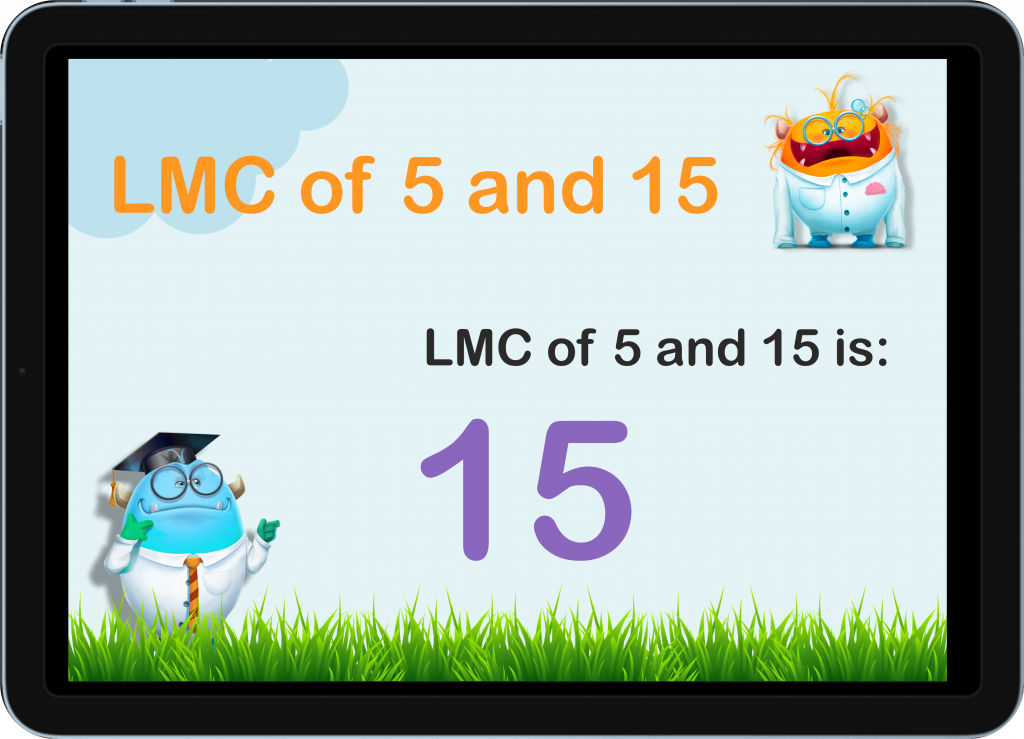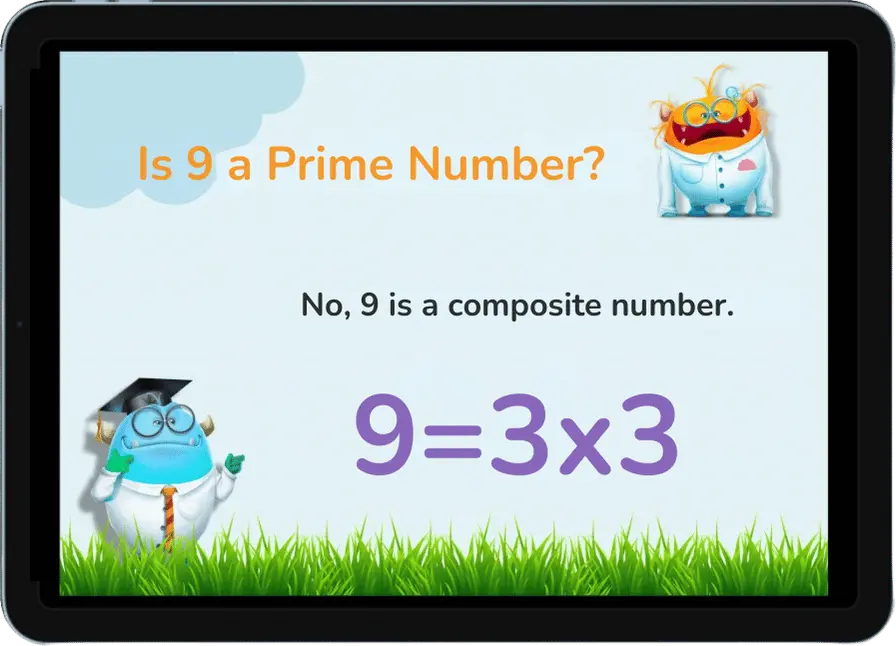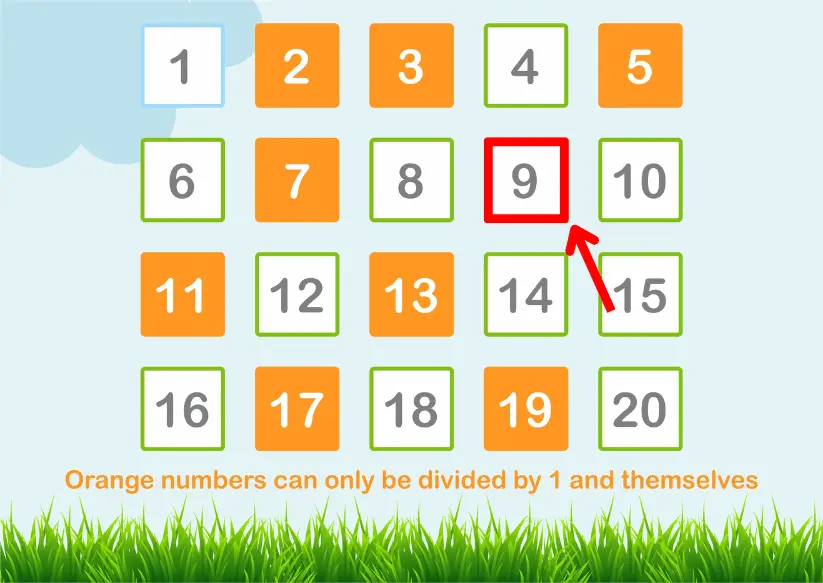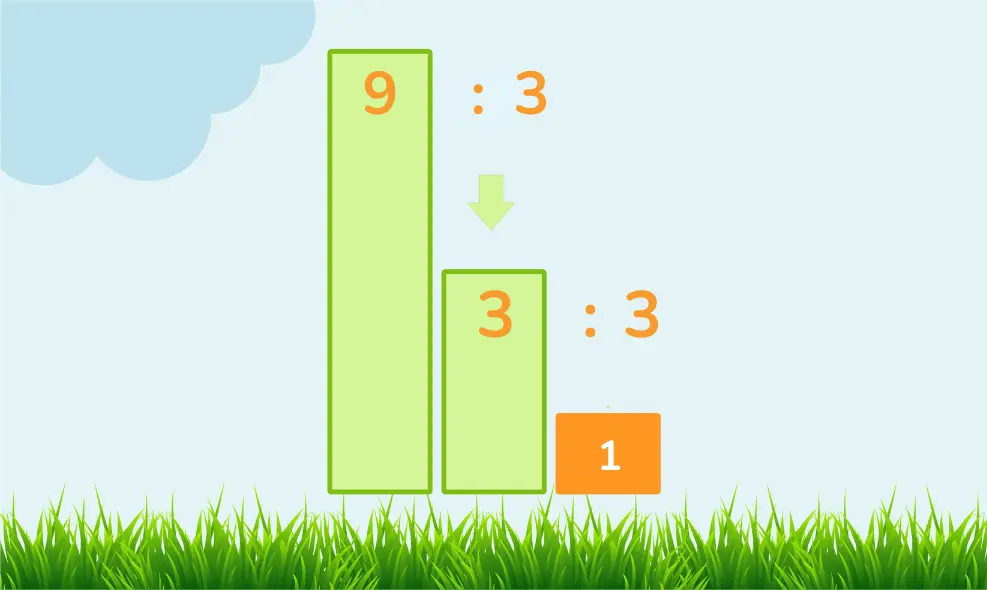Is 2 A Prime Number?
Prime vs. Composite Numbers
Greetings, young math enthusiasts! Today, let’s set sail on a mathematical voyage to determine if 2 is a prime number, and learn more about the difference between prime and composite numbers.

Is 9 a Prime Number?
Or is 9 a Composite Number?
Hey there, math adventurers! Today we’re diving into the exciting world of number nine, where we’ll learn about it’s prime factorization. Buckle up and get ready for a math adventure!


No credit card required

No credit card required
What Are Prime Numbers?
Is 9 a Prime Number?
Why is 9 Not a Prime Number?
Why is 9 a Composite Number?
What are the Factors of 9?
What Type of Number is 9?
Is 9 a Semiprime Number?
What is So Special About Number 9?
Before You Go…
What Are Prime Numbers?
So, what are prime and composite numbers? Think of it like this: Prime numbers are your closest friends—they can only be divided by 1 and themselves, like 2, 3, and 5.
Composite numbers, on the other hand, are like a big party with lots of guests. They can be divided by more than just 1 and themselves. Numbers like 4, 6, and 8 are composite because they have multiple factors.
Is 9 a Prime Number?

Now, let’s talk about the number 9. Is 9 a prime number? Drumroll, please… No, it’s not! But why is that? Let’s find out.
Why is 9 Not a Prime Number?
The number 9 is not a prime number because it can be divided by more than just 1 and itself. You see, 9 can be divided by 1, 3, and 9. Since it has more than two factors, it doesn’t belong to the exclusive prime number club. It’s a composite number, and that’s just as cool!
Is 9 a Composite Number?
Yes, 9 is definitely a composite number. Remember, a composite number has more than two factors. For 9, those factors are 1, 3, and 9. So, it fits right into the composite number party with all its friends!
What are the Factors of 9?

Factors are the numbers you can multiply together to get another number. So, what are the factors of 9? The factors of 9 are 1, 3, and 9. This means you can multiply 1 x 9 and 3 x 3 to get 9. Pretty neat, right?
Does 9 Only Have 2 Factors?
Nope, 9 has more than 2 factors. It has three factors: 1, 3, and 9. Remember, prime numbers have exactly two factors, but composite numbers like 9 can have more.
What Type of Number is 9?
So, what type of number is 9? Let’s break it down:
Composite Number: As we mentioned, 9 is a composite number because it has more than two factors.
Odd Number: 9 is an odd number because it cannot be divided by 2 without leaving a remainder. Any number ending in 1, 3, 5, 7, or 9 is considered odd.
Square Number: 9 is a square number because it’s the result of multiplying a number by itself. In this case, 3 x 3 = 9. Other examples of square numbers are 1 (1 x 1), 16 (4 x 4), and 25 (5 x 5).
Real Number: 9 is a real number, which means it’s a value that represents a quantity along a continuous line. All rational and irrational numbers are real numbers.
Natural Number: 9 is a natural number because it’s a positive integer. Natural numbers are used for counting (1, 2, 3, 4, …).
Whole Number: 9 is also a whole number, which includes all natural numbers and the number 0.
Is 9 a Semiprime Number?
A semiprime number is a number that is the product of exactly two prime numbers. For example, 6 is a semiprime because it’s 2 x 3. 9 is a semiprime number because it’s the product of the same prime number multiplied by itself (3 x 3). So, 9 is a semiprime.
What is So Special About Number 9?
Now that we’ve covered the basics, let’s dive into some fun facts about the number 9:
Multiplication Magic: Did you know that if you multiply 9 by any number and then add the digits of the result, you’ll get 9? For example, 9 x 3 = 27, and 2 + 7 = 9. Cool, right?
Nine Lives: Cats are said to have nine lives. While not true, it adds a fun mythical twist to the number 9!
Cloud Nine: Being on “cloud nine” means being extremely happy or on top of the world.
Enneagram: The enneagram is a model of the human psyche which is principally understood and taught as a typology of nine interconnected personality types.
Ninth Symphony: Beethoven’s Ninth Symphony is one of the most famous pieces of classical music.
Sports: In baseball, there are nine innings in a standard game, and a team fields nine players at a time.
Before You Go…
Keep exploring the world of numbers, and you’ll find even more amazing facts and tricks! Happy learning!
Learn More About Prime Numbers
© 2024 Smartick. All Rights Reserved.
